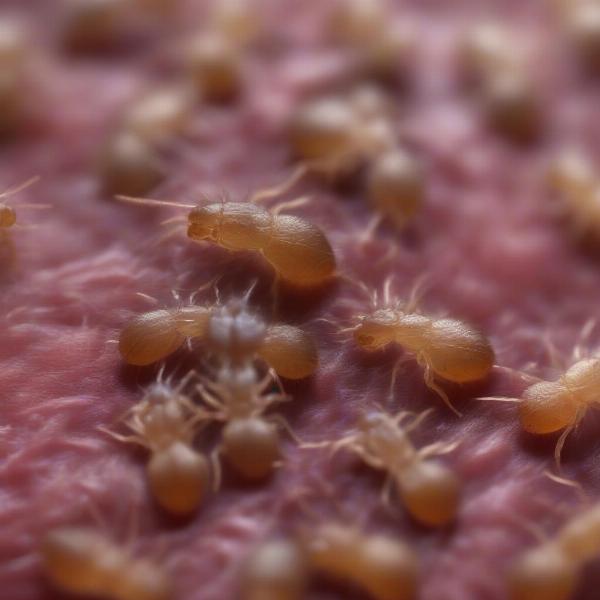Worms and fleas are common parasites that can plague our canine companions, causing discomfort and even serious health issues. Understanding the importance of dog wormer and flea treatment is crucial for responsible pet ownership. This guide provides in-depth information on these parasites, prevention methods, and the best treatment options available, helping you keep your furry friend happy and healthy.
Understanding the Importance of Deworming Your Dog
Internal parasites, or worms, can infest a dog’s digestive system, leading to a range of problems from mild discomfort to life-threatening conditions. Puppies are especially vulnerable to worms, often inheriting them from their mothers. Regular deworming is essential to prevent these infestations and protect your dog’s health. There are various types of worms, including roundworms, hookworms, tapeworms, and whipworms, each requiring specific treatment.
Effective Flea Control for Your Dog
 Dog Flea Infestation
Dog Flea Infestation
Fleas are tiny, wingless insects that thrive on the blood of mammals, including dogs. A flea infestation can cause intense itching, leading to scratching, hair loss, and skin infections. Beyond the discomfort they cause, fleas can also transmit diseases and parasites like tapeworms. Effective flea control requires a multi-pronged approach, including treating your dog, their environment, and preventing future infestations.
Choosing the Right Wormer and Flea Treatment
Selecting the appropriate wormer and flea treatment for your dog depends on several factors, including their age, weight, breed, and lifestyle. Consult your veterinarian to determine the best course of action. They can recommend products that target specific parasites prevalent in your area and address any underlying health concerns. There are various types of treatments available, including oral medications, topical treatments, and flea collars. Your veterinarian can help you choose the most effective and safe option for your dog.
Preventing Parasites: Proactive Measures for a Healthy Dog
Regular preventative measures are crucial in protecting your dog from worms and fleas. Maintain a clean living environment for your dog, regularly washing their bedding and vacuuming carpets. Year-round flea and tick prevention is recommended, especially in warmer climates. Always consult with your veterinarian before starting any new preventative treatment.
What to Do if Your Dog Has Worms or Fleas
If you suspect your dog has worms or fleas, consult your veterinarian immediately. They will perform a thorough examination and recommend the appropriate treatment plan. Early detection and treatment are essential to prevent further complications and ensure your dog’s well-being. Don’t delay seeking professional advice if you notice any signs of parasite infestation.
Conclusion: Protecting Your Canine Companion from Pests
Protecting your dog from worms and fleas is a vital part of responsible pet ownership. By understanding the importance of dog wormer and flea treatment and implementing preventative measures, you can ensure your furry friend lives a long, healthy, and parasite-free life. Regular checkups with your veterinarian, combined with appropriate preventative treatments, are the best way to safeguard your dog’s health.
FAQ
- How often should I deworm my dog? Puppies should be dewormed every 2-3 weeks until they are 12 weeks old, then monthly until they are six months old. Adult dogs should be dewormed at least every three months, or more frequently if recommended by your veterinarian.
- What are the signs of a flea infestation? Excessive scratching, hair loss, red and irritated skin, and small black specks (flea dirt) on your dog’s fur are common signs of a flea infestation.
- Can I use over-the-counter wormers and flea treatments? While over-the-counter products are available, it’s always best to consult your veterinarian before using them. They can recommend the most appropriate and effective treatment for your dog’s specific needs.
- Are there natural remedies for worms and fleas? Some natural remedies may offer some level of protection, but they are often not as effective as conventional treatments. Consult your veterinarian before using any natural remedies.
- How can I prevent my dog from getting worms and fleas? Regular preventative treatments, maintaining a clean environment, and avoiding contact with infected animals are crucial for preventing parasite infestations.
- What are the risks of not treating worms and fleas? Untreated worm and flea infestations can lead to various health problems, including anemia, skin infections, and even transmission of diseases to humans.
- Can humans get worms or fleas from dogs? Yes, some types of worms and fleas can be transmitted from dogs to humans. Maintaining good hygiene and treating your dog for parasites are essential for preventing cross-contamination.
Related Articles
ILM Dog is a leading international dog care website dedicated to providing expert advice on all aspects of dog ownership, from breed selection and health care to training and nutrition. We offer a wealth of resources, including informative articles, product reviews, and expert tips to help you provide the best possible care for your canine companion. Contact us today for professional guidance and support: Email: [email protected], Phone: +44 20-3965-8624. ILM Dog is committed to helping you and your dog live a happy and healthy life together.